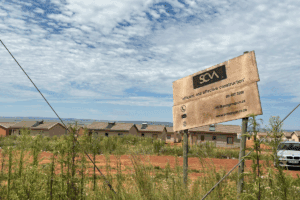According to the minister, critics are 'making a mountain out of an anthill about those horrible people in Washington who carry bricks will break your bones if you don't repay'.

A briefing aimed at breaking down how the R500 billion economic relief package announced by President Cyril Ramaphosa earlier this week will be spent quickly turned into a Q&A session that saw Finance Minister Tito Mboweni shoot down concerns about the origin of the funding, loan terms and the country’s debt responsibility.
Overall, the country has R800 billion in fiscal and monetary policy funding to use in interventions aimed at mitigating the economic impact of the lockdown period.
This funding can be broken down into five main components, which were outlined as follows:
- A R20 billion boost to the health budget to supplement strain provided by the coronavirus
- A R50 billion budget for the relief of hunger and social distress. This covers the additional amounts that will be paid out to grant recipients over the next six months
- An undisclosed amount for support for companies and workers
- Funds to assist in the phased reopening of the economy; and finally
- Funds to support monetary and financial market measures
Among the sources for the funding were previously tabled budget items that could be postponed or became obsolete since the national lockdown was implemented – items such as funding for the tourism sector.
The minister went on to address concerns about funding from the International Monetary Fund (IMF) and other international institutions by stating that that the support provided by the IMF and other institutions during this period was specific to Covid-19.
“It’s not the usual budget support or policy intervention or technical assistance and conditionality and things like that.”
According to the minister, critics have been “making a mountain out of an anthill about those horrible people in Washington who carry with them stones that will break your bones if you don’t pay back”.
Mboweni said that as a member of the IMF and World Bank that was up to date on its subscriptions and contributions, South Africa “entitled to apply for its funding”.
As such, the IMF has indicated that South Africa is eligible for up to $4.2 billion in funding while the World Bank is offering between $55 million and $60 million in assistance.
This was in addition to the $1 billion in relief that the New Development Bank linked to Brics had set aside for South Africa should the need arise.
Treasury forecasted that a further R200 billion could be “unlocked” through the national credit guarantee scheme, which will be launched next week.
The scheme is being launched with the aim of helping businesses with a turnover of less than R300 million.
“It’s not money in the hands of the fiscus, but it’s funding in the economic system,” added Mboweni.
“As soon as the lockdown lifts, and the economy begins to move, we will see the scheme being utilised by businesses.”
On the topic of businesses, the minister simply and soberly stated that some companies would make it and some would not and added that we would see new companies arise from the ashes of those that had fallen.
Treasury would soon table a new budget before parliament to accommodate the changes brought about by measures implemented to assist individuals and companies during the lockdown period. Although the country was believed to be heading for a soft easing of the lockdown come May, these measures would continue to be accommodated within the current economic policy framework.
Among these measures will be:
– An increase in the expanded employment tax incentives amount from R500 to R750 per employee
– A skill development levy holiday of four months from 1 of May 2020
– Fast-tracking of VAT refunds
– Deferring the payment of excise duty on alcoholic beverages and tobacco products
– A three-month deferral for filing and first payment of carbon tax liabilities to 31 October 2010
– A postponement for some to the corporate tax proposals in this year’s budget on interest expenses and assessed losses
– An increase in the deferment of employee tax
– An increase in the turnover threshold for deferrals
– The setting up of the Solidarity Fund, which has, to date, already spent more than R1 billion on social relief and personal protective equipment for healthcare and other essential workers
– Expanded access to living annuity funds
Lastly, Mboweni summarily dismissed questions about the printing of extra money to boost the country’s economy and fund some of these initiatives, adding that Treasury is “not in that business” so he did not even understand why that was a question.
For more news your way, download The Citizen’s app for iOS and Android.






